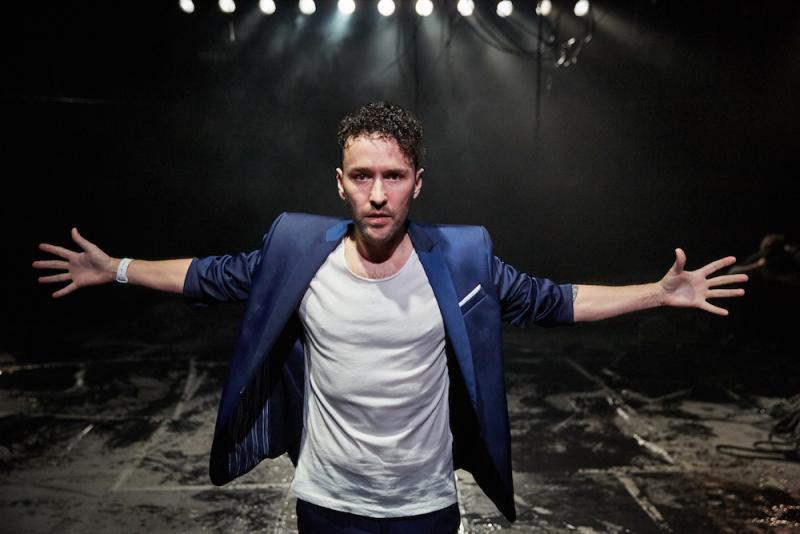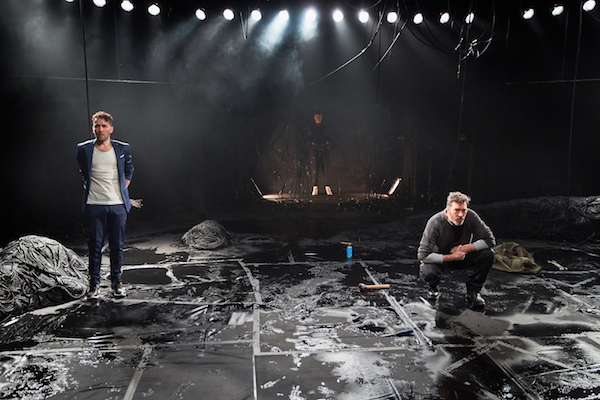Killology, Royal Court review – both disturbing and life-affirming | reviews, news & interviews
Killology, Royal Court review – both disturbing and life-affirming
Killology, Royal Court review – both disturbing and life-affirming
Three monologues brilliantly summon up a punchy world of pain and violence

The monologue is a terrific theatre form. Using this narrative device, you can cover huge amounts of storytelling territory, fill in lots of background detail – and get right inside a character’s head. But the best monologues are those that interlock with other solo voices, giving different points of view on the same situation.
Bad fathering makes us more prone to behaving violently
Owen fields three characters: Paul, son of an industrialist, has invented a game, Killology, in which players torture their victims. Sounds gross enough, but Paul has given it an extra dimension: you score more points depending on how creative you are in your torturing. And you lose points if you turn away in horror from watching the depiction of your violence. Paul was inspired by a sense of competing with his father, and this game has become wildly successful, but what about his own desire for kids?
Then there’s Alan, whose son has suffered an appalling act of violence, inspired by Paul’s game. Now Alan wants to inflict retribution on Paul, whom he holds responsible for his son’s tragedy. He plans his revenge meticulously, but can he go through with it? And can his life survive this injection of hatred? And, finally, there’s Davey, raised by a single mother and living in poverty. His world is peopled by bullies and absent fathers, and his main source of love is Maisie, a mongrel dog. Without a father, can this young teen make something positive of life – or is it already too late?
Owen’s main theme is father and son relationships, and the destructive masculinity that comes from either too much money or too little money. The play examines three different cases of personal responsibility, and its emotional core is the powerful idea that you can turn your life around, that you mustn’t give up. While this is stirring, what Owen’s writing does is place its hand right inside your chest and grip your heart, ventricle by ventricle. At moments, this almost chokes you up; at other times, the verbal torrent carries into dark places: the bullying scenes are unbearable.
 On one hand, Killology is a tract about parental responsibility, and it balances the brief pleasures of fatherhood with the nagging anxieties of paternity. On the other, it is a bravura performance of storytelling, with episodes that seem to be part of one story, or maybe only fantasies. Or both. Owen analyses our revulsion from violence, and shows how video games, and indeed all creative art, might be habituating us to accept the unspeakable. Provocatively, he even suggests that bad fathering might makes us more prone to behaving violently.
On one hand, Killology is a tract about parental responsibility, and it balances the brief pleasures of fatherhood with the nagging anxieties of paternity. On the other, it is a bravura performance of storytelling, with episodes that seem to be part of one story, or maybe only fantasies. Or both. Owen analyses our revulsion from violence, and shows how video games, and indeed all creative art, might be habituating us to accept the unspeakable. Provocatively, he even suggests that bad fathering might makes us more prone to behaving violently.
This is a dense and complex piece of writing. Thinking about it, Owen doesn’t quite succeed in making the connection between art (the video game) and bad parenting, and he struggles to relate the Killology game to underclass violence. What he does show is how each generation reproduces the bad stuff of previous generations, and how a decision to do the wrong thing might, under exceptional circumstances, result in a person doing the right thing (eventually). By offering two scenarios of the Alan and Davey relationship he also shows how our fate lies squarely in our own hands, which is where it should be (whatever our experience of parenting, or being parented).
Brilliantly directed by Rachel O’Riordan of Cardiff’s Sherman Theatre, with a black, water-soaked, dark set by Gary McCann (pictured above), loaded with the detritus of curled grey industrial ropes and dangling digital cables, this is a thoroughly overwhelming production, which pulls at your heart and at your tear ducts. And dazzles you with explosive ideas and mind pictures. All the performances are superb: Richard Mylan’s Paul is slick, charming and off-putting, Seán Gleeson’s Alan is stolid, serious and deeply angry, while Sion Daniel Young’s Davey is energetic, callow and wonderfully open. A beautiful balance of love and hate, Killology is both disturbing and life-affirming.
rating
Explore topics
Share this article
The future of Arts Journalism
You can stop theartsdesk.com closing!
We urgently need financing to survive. Our fundraising drive has thus far raised £49,000 but we need to reach £100,000 or we will be forced to close. Please contribute here: https://gofund.me/c3f6033d
And if you can forward this information to anyone who might assist, we’d be grateful.

Subscribe to theartsdesk.com
Thank you for continuing to read our work on theartsdesk.com. For unlimited access to every article in its entirety, including our archive of more than 15,000 pieces, we're asking for £5 per month or £40 per year. We feel it's a very good deal, and hope you do too.
To take a subscription now simply click here.
And if you're looking for that extra gift for a friend or family member, why not treat them to a theartsdesk.com gift subscription?
more Theatre
 Cow | Deer, Royal Court review - paradox-rich account of non-human life
Experimental work about nature led by Katie Mitchell is both extraordinary and banal
Cow | Deer, Royal Court review - paradox-rich account of non-human life
Experimental work about nature led by Katie Mitchell is both extraordinary and banal
 Deaf Republic, Royal Court review - beautiful images, shame about the words
Staging of Ukrainian-American Ilya Kaminsky’s anti-war poems is too meta-theatrical
Deaf Republic, Royal Court review - beautiful images, shame about the words
Staging of Ukrainian-American Ilya Kaminsky’s anti-war poems is too meta-theatrical
 Laura Benanti: Nobody Cares, Underbelly Boulevard Soho review - Tony winner makes charming, cheeky London debut
Broadway's acclaimed Cinderella, Louise, and Amalia reaches Soho for a welcome one-night stand
Laura Benanti: Nobody Cares, Underbelly Boulevard Soho review - Tony winner makes charming, cheeky London debut
Broadway's acclaimed Cinderella, Louise, and Amalia reaches Soho for a welcome one-night stand
 The Pitchfork Disney, King's Head Theatre review - blazing with dark energy
Thrilling revival of Philip Ridley’s cult classic confirms its legendary status
The Pitchfork Disney, King's Head Theatre review - blazing with dark energy
Thrilling revival of Philip Ridley’s cult classic confirms its legendary status
 Born with Teeth, Wyndham's Theatre review - electric sparring match between Shakespeare and Marlowe
Rival Elizabethan playwrights in an up-to-the-minute encounter
Born with Teeth, Wyndham's Theatre review - electric sparring match between Shakespeare and Marlowe
Rival Elizabethan playwrights in an up-to-the-minute encounter
 Interview, Riverside Studios review - old media vs new in sparky scrap between generations
Robert Sean Leonard and Paten Hughes make worthy sparring partners
Interview, Riverside Studios review - old media vs new in sparky scrap between generations
Robert Sean Leonard and Paten Hughes make worthy sparring partners
 Fat Ham, RSC, Stratford review - it's Hamlet Jim, but not as we know it
An entertaining, positive and contemporary blast!
Fat Ham, RSC, Stratford review - it's Hamlet Jim, but not as we know it
An entertaining, positive and contemporary blast!
 Juniper Blood, Donmar Warehouse review - where ideas and ideals rule the roost
Mike Bartlett’s new state-of-the-agricultural-nation play is beautifully performed
Juniper Blood, Donmar Warehouse review - where ideas and ideals rule the roost
Mike Bartlett’s new state-of-the-agricultural-nation play is beautifully performed
 The Gathered Leaves, Park Theatre review - dated script lifted by nuanced characterisation
The actors skilfully evoke the claustrophobia of family members trying to fake togetherness
The Gathered Leaves, Park Theatre review - dated script lifted by nuanced characterisation
The actors skilfully evoke the claustrophobia of family members trying to fake togetherness
 As You Like It: A Radical Retelling, Edinburgh International Festival 2025 review - breathtakingly audacious, deeply shocking
A cunning ruse leaves audiences facing their own privilege and complicity in Cliff Cardinal's bold theatrical creation
As You Like It: A Radical Retelling, Edinburgh International Festival 2025 review - breathtakingly audacious, deeply shocking
A cunning ruse leaves audiences facing their own privilege and complicity in Cliff Cardinal's bold theatrical creation
 Edinburgh Fringe 2025 reviews: Refuse / Terry's / Sugar
A Ukrainian bin man, an unseen used car dealer and every daddy's dream twink in three contrasting Fringe shows
Edinburgh Fringe 2025 reviews: Refuse / Terry's / Sugar
A Ukrainian bin man, an unseen used car dealer and every daddy's dream twink in three contrasting Fringe shows
 Faustus in Africa!, Edinburgh International Festival 2025 review - deeply flawed
Bringing the Faust legend to comment on colonialism produces bewildering results
Faustus in Africa!, Edinburgh International Festival 2025 review - deeply flawed
Bringing the Faust legend to comment on colonialism produces bewildering results

Add comment